夜莺颂中英对照
- 格式:docx
- 大小:18.36 KB
- 文档页数:6
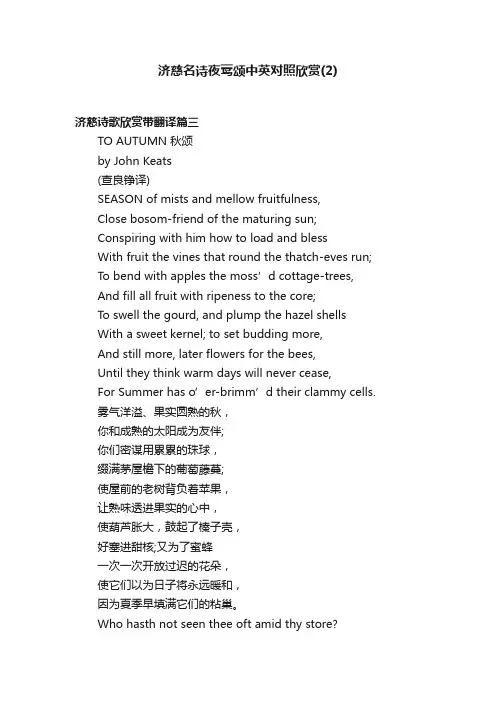
济慈名诗夜莺颂中英对照欣赏(2)济慈诗歌欣赏带翻译篇三TO AUTUMN 秋颂by John Keats(查良铮译)SEASON of mists and mellow fruitfulness,Close bosom-friend of the maturing sun;Conspiring with him how to load and blessWith fruit the vines that round the thatch-eves run;To bend with apples the moss’d cottage-trees,And fill all fruit with ripeness to the core;To swell the gourd, and plump the hazel shellsWith a sweet kernel; to set budding more,And still more, later flowers for the bees,Until they think warm days will never cease,For Summer has o’er-brimm’d their clammy cells.雾气洋溢、果实圆熟的秋,你和成熟的太阳成为友伴;你们密谋用累累的珠球,缀满茅屋檐下的葡萄藤蔓;使屋前的老树背负着苹果,让熟味透进果实的心中,使葫芦胀大,鼓起了榛子壳,好塞进甜核;又为了蜜蜂一次一次开放过迟的花朵,使它们以为日子将永远暖和,因为夏季早填满它们的粘巢。
Who hasth not seen thee oft amid thy store?Sometimes whoever seeks abroad may findThee sitting careless on a granary floor,Thy hair soft-lifted by the winnowing wind;Or on a half-reap’d furrow sound asleep. Drowsed with the fumes of poppies, while thy hook Spares the next swath and all its twined flowers: And sometimes like a gleaner thou dost keep Steady thy laden head across a brook;Or by a cyder-press, with patient look,Thou watchest the last oozings hours by hours.谁不经常看见你伴着谷仓?在田野里也可以把你找到,弥有时随意坐在打麦场上,让发丝随着簸谷的风轻飘;有时候,为罂粟花香所沉迷,你倒卧在收割一半的田垄,让镰刀歇在下一畦的花旁;或者.像拾穗人越过小溪,你昂首背着谷袋,投下倒影,或者就在榨果架下坐几点钟,你耐心地瞧着徐徐滴下的酒浆。
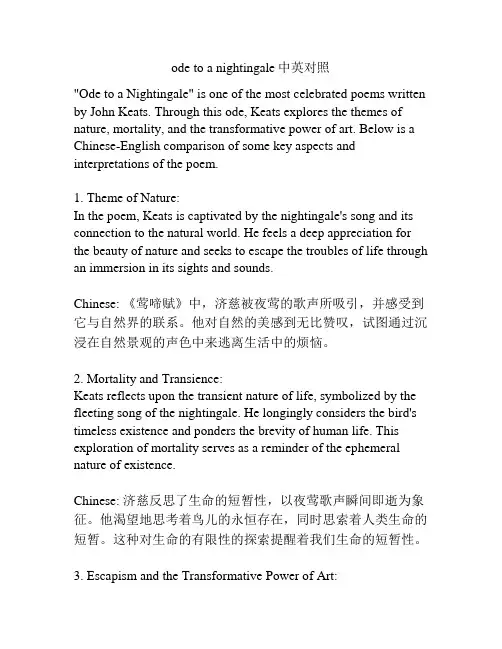
ode to a nightingale中英对照"Ode to a Nightingale" is one of the most celebrated poems written by John Keats. Through this ode, Keats explores the themes of nature, mortality, and the transformative power of art. Below is a Chinese-English comparison of some key aspects and interpretations of the poem.1. Theme of Nature:In the poem, Keats is captivated by the nightingale's song and its connection to the natural world. He feels a deep appreciation for the beauty of nature and seeks to escape the troubles of life through an immersion in its sights and sounds.Chinese: 《莺啼赋》中,济慈被夜莺的歌声所吸引,并感受到它与自然界的联系。
他对自然的美感到无比赞叹,试图通过沉浸在自然景观的声色中来逃离生活中的烦恼。
2. Mortality and Transience:Keats reflects upon the transient nature of life, symbolized by the fleeting song of the nightingale. He longingly considers the bird's timeless existence and ponders the brevity of human life. This exploration of mortality serves as a reminder of the ephemeral nature of existence.Chinese: 济慈反思了生命的短暂性,以夜莺歌声瞬间即逝为象征。
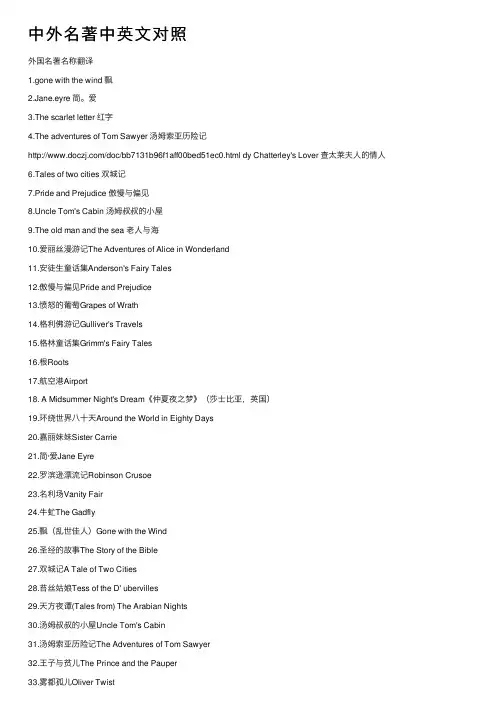
中外名著中英⽂对照外国名著名称翻译1.gone with the wind 飘2.Jane.eyre 简。
爱3.The scarlet letter 红字4.The adventures of Tom Sawyer 汤姆索亚历险记/doc/bb7131b96f1aff00bed51ec0.html dy Chatterley's Lover 查太莱夫⼈的情⼈6.Tales of two cities 双城记7.Pride and Prejudice 傲慢与偏见8.Uncle Tom's Cabin 汤姆叔叔的⼩屋9.The old man and the sea ⽼⼈与海10.爱丽丝漫游记The Adventures of Alice in Wonderland11.安徒⽣童话集Anderson's Fairy Tales12.傲慢与偏见Pride and Prejudice13.愤怒的葡萄Grapes of Wrath14.格利佛游记Gulliver's Travels15.格林童话集Grimm's Fairy Tales16.根Roots17.航空港Airport18. A Midsummer Night's Dream《仲夏夜之梦》(莎⼠⽐亚,英国)19.环绕世界⼋⼗天Around the World in Eighty Days20.嘉丽妹妹Sister Carrie21.简·爱Jane Eyre22.罗滨逊漂流记Robinson Crusoe23.名利场Vanity Fair24.⽜虻The Gadfly25.飘(乱世佳⼈)Gone with the Wind26.圣经的故事The Story of the Bible27.双城记A Tale of Two Cities28.苔丝姑娘Tess of the D' ubervilles29.天⽅夜谭(Tales from) The Arabian Nights30.汤姆叔叔的⼩屋Uncle Tom's Cabin31.汤姆索亚历险记The Adventures of Tom Sawyer32.王⼦与贫⼉The Prince and the Pauper33.雾都孤⼉Oliver Twist34.伊索寓⾔Aesop's Fables35.远⼤前程The Great Expectations36.⽉亮宝⽯The Moonstone37.最后的诊断The Final Diagnosis38.Charles Darwin (by Carla Greene) 查尔斯;达尔⽂39.John F. Kennedy (by Charles P. Graves) 约翰;肯尼迪40.King Arthur and His Knights (by William Kottmeyer) 亚瑟王和他的骑⼠41.One Million Pound (by Mark Twain) 百万英镑42.Robin Hood (adapted by Michael West) 罗宾汉43.Rip Van Winkle (adapted by Michael West) ⾥普;范;温格尔44.Stories from the Sands of Africa (adapted by Michael West) ⾮洲沙漠的故事45.Tales from the Arabian Nights (adapted by Michael West) 天⽅夜谭46.The Canterbury Tales (adapted by Michael West) 坎特伯雷故事集47.The House of a Thousand Lanterns (by Victoria Holt) 千灯府48.The Legends of Ancient Rome 古罗马的传说49.The Mystery of the Island (by Jules Verne) 神秘的海岛50.The Seventh Key 第七把钥匙51.Three Men on the Bummel (by K. Jerome) 三⼈出游记52.Tom Jones (by Henry Fielding) 汤姆;琼斯53.Airport (by Arthur Hailey) 航空港54.Around the World in Eighty Days (by Jules Verne) 环绕世界⼋⼗天55. A Separate Peace (by John Knowles) 独⾃和解56.Daisy Miller (by H. James) 黛丝密勒57.Dr Jekyll and Mr Hyde (by R. L. Stevenson) 化⾝博⼠58.Flowers for Mrs. Harris (by Paul Gallico) 献给哈⾥斯夫⼈的鲜花59.Frankenstein (by Mary Shelly) 弗兰肯斯特60.Hatter's Castle (by A. J. Cronin) 帽商的城堡61.Little Tom (by B. Bell & D. Bell) ⼩汤姆62.Lucky Jim (by Kingsley Amis) 幸运的吉姆63.The Adventures of Alice in Wonderland (by Lewis Carrol) 艾丽斯漫游记64.The Black Tulip (by Alexandre Dumas) ⿊郁⾦⾹65.The Life of Abraham Lincoln (by Stegan Lorant) 林肯传66.The Mill on the Floss (by George Eliot) 弗洛斯河上的磨坊67.The Prince and the Pauper (by Mark Twain) 王⼦和贫⼉68.The Red Badge of Courage (by Stephen Crane) 红⾊英勇勋章69.The Scapegoat (by Daphne Du Maurier) 替罪⽺70.The Sign of Indra 印达拉神像71.Thirty-nine Steps (by John Buchan) 三⼗九级台阶72.Three Men in a Boat (by J. K. Jerome) 三⼈同⾈73.Tom Brown's Schooldays (by Thomas Hughes) 汤姆;布朗的求学时代74.Witch (by George Mackay Brown) ⼥巫75.Aesop's Fables 伊索寓⾔76.Anderson's Fairy Tales 安徒⽣通话选/doc/bb7131b96f1aff00bed51ec0.html pell's Kingdom (by Hammond Innes) 坎伯尔王国78.Frontiers of Science 科学的新领域79.Grimm's Fairy Tales 格林通话选80.Hotel (by Arthur Hailey) 旅馆81.Jamaica Inn (by Daphne Du Maurier) ⽛买加旅店82.Popular Science Readings 英语科普⼩品83.Roots (by Alex Harley) 根84.Stories from Shakespeare (adapted by H. G. Wyatt) 莎⼠⽐亚戏剧故事集85.The Adventures of Huckleberry Fin (by Mark Twain) 哈克贝⾥芬历险记86.The Adventures of Tom Sawyer (by Mark Twain) 汤姆索亚历险记87.The “Caine” Mutiny (by Herman Wink) “该隐”号兵变记88.The Citadel (by A. J. Cronin) 堡垒89.The Good Soldier Schweik (by Jaroslav Hasek, trans. By Paul Selver) 好兵帅克90.The Moonstone (by Wilkie Collins) ⽉亮宝⽯91.The Pearl (by John Steinbeck) 珍珠92.The Story of Madame Curie ( by Alice Thorne) 居⾥夫⼈传93.Uncle Tom's Cabin (by H. Beecher Stowe) 汤姆叔叔的⼩屋94.Anna Karenina (by Leo Tolstoy) 安娜;卡列尼娜95. A Tale of Two Cities (by Charles Dickens) 双城记96.David Copperfield (by Charles Dickens) ⼤卫考伯菲尔德97.Emma (by Jane Austen) 爱玛98.Far from the Madding Crowd (by Thomas Hardy) 远离尘嚣99.Frenchman's Creek (by Charles Dickens) 法国⼈的⼩港湾100.Great Expectations (by Charles Dickens) 远⼤前程101.Gulliver's Travels (by Jonathan Swift) 格利佛游记102.Jane Eyre (by Charlotte Bronte) 简爱103.Jaws (by Peter Benchley) ⼤⽩鲨104.Lucky Jim (by Kinsley Amis) 幸运的吉姆105.Nicholas Nickleby (by Charles Dickens) 尼古拉斯.尼克尔贝106.Mary Barton (by Elizabeth Cleghorn Gaskell) 玛丽.巴顿107.Monte Cristo (by Alexandre Dumas) 基度⼭伯爵108.Oliver Twist (by Charles Dickens) 雾都孤⼉109.Pride and Prejudice (by Jane Austen) 傲慢与偏见110.Rebecca (by Daphne Du Maurier) 蝴蝶梦111.Silas Marner (by George Eliot) 塞拉斯.马纳112.Tess of the D'ubervilles (by Thomas Hardy) 德伯家的苔丝113.The Green Years (by A. Cronin) 青春的岁⽉114.The Hunckback of Notre Dame (by Victor Hugo) 巴黎圣母院115.The Mayor of Casterbridge (by Thomas Hardy) 卡斯特桥市长116.The Three Musketeers (by Alexandre Dumas) 三个⽕枪⼿117.Treasure Island (by R. L. Steveson) ⾦银岛118.Vanity Fair (by W. M. Thackeray) 名利场119.Woman in White (by Wilkie Collins) ⽩⾐⼥⼈120.A Doll's House《玩偶之家》(亨⾥克·易⼘⽣,挪威)121.Alice's Adventures in Wonderland (by Lewis Carrol) 艾丽斯漫游记122.Child's History of England (by Charles Dickens) ⼉童英国史123.Good-bye, Mr. Chips (by James Hilton) 再会,契普斯先⽣124.INTERPOL (by Peter G. Lee) 国际警察组织125.Robinson Crusoe (by Daniel Defoe) 鲁滨逊漂流记126.The Gadfly (by E. L. Voynich) ⽜虻127.The Story of the Bible (by Van Loon) 圣经的故事128.The Story of Mankind (by H. William Van Loon) ⼈类的故事129.The Great Road (by Agnes Smedley) 伟⼤的道路130.An Inspector Calls (by J. B. Priestley) 罪恶之家131.An Invisible Man (by H. G. Wells) 隐⾝⼈132.A Tale of Two Cities (by Charles Dickens) 双城记133.David Copperfield (by Charles Dickens) ⼤卫.考伯菲尔德134.Emma (by Jane Austen) 爱玛135.Gone with the Wind (by Margaret Mitchell) 飘136.Gulliver's Travels (by Jonathan Swift) 格利佛游记137.Hotel (by Arthur Hailey) 旅馆138.Oliver Twist (by Charles Dickens) 雾都孤⼉139.Pride and Prejudice (by Jane Austen) 傲慢与偏见140.Pygmalion (by Bernald Shaw) 茶花⼥141.Red Star over China (by Edgar Snow) 西⾏漫记142.Roots (by Alex Haley) 根143.Selected Readings from D. H. Lawrence 劳伦斯作品选读144.The Adventures of Huckleberry Fin (by mark Twain) 哈克.贝⾥芬历险记145.The Adventures of Tom Sawyer (by Mark Twain) 汤姆.索亚历险记146.The Jungle (by Upton Sinclair) 丛林147.The Old Man and The Sea (by Ernest Hemingway) ⽼⼈与海148.The Ragged Trousered Philanthropists (by Robert Tressell) 穿破裤⼦的慈善家149.The Rise and Fall of the Third Reich (by William L. Shirer) 第三帝国的兴亡150.Uncle Tom's Cabin (by H. Beecher Stowe) 汤姆叔叔的⼩屋151.Winds of War (by Herman Woul) 战争风云152.A Farewell to Arms (by Ernest Hemingway) 永别了武器153.Airport (by Arthur Hailey) 航空港154.A Tale of Two Cities (by Charles Dickens) 双城记155.Financier (by Theodore Dreiser) 财政家156.Grapes of Wrath (by J. Steinbeck) 愤怒的葡萄157.Jane Eyre (by Charlotte Bronte) 简爱158.Jude the Obscure (by Thomas Hardy) ⽆名的裘德/doc/bb7131b96f1aff00bed51ec0.html dy Chatterley's Lover (by D. H. Lawrence)查泰莱夫⼈德情⼈160.Martin Eden (by Jack London) 马丁.伊登161.Pride and Prejudice (by Jane Austen) 傲慢与偏见162.Sense and Sensibility (by Jane Austen) 理智与情感163.Sister Carrie (by Theodore Dreiser) 嘉丽妹妹164.Sons and Lovers (by D. H. Lawrence) ⼉⼦和情⼈165.Tess of the D'ubervilles (by Thomas Hardy) 德伯家的苔丝166.The American Tragedy (by Theodore Dreiser) 美国的悲剧167.The Final Diagnosis (by Arthur Hailey) 最后的诊断168.The God Father (by Mario Puzo) 教⽗169.The Great Gatsby (by F. Scott Fitzgerald) 了不起的盖茨⽐170.The Hunckback of Notre Dame (by Victor Hugo) 巴黎圣母院171.The Moneychangers (by Arthur Hailey) 钱商172.The Rainbow (by D. H. Lawrence) 虹173.The Red and The Black (by Stendhal) 红与⿊174.The Return to the Native (by Thomas Hardy) 还乡175.The Scarlet Letter (by Nathaniel Hawthorne) 红字176.The Sun Also Rises (by Ernest Hemingway) 太阳照样升起177.The Thorn Birds (by Colleen Mccullough) 荆棘鸟178.The Three Musketeers (by Alexandre Dumas) 三个⽕枪⼿179.Vanity Fair (by W. M. Thackeray) 名利场180.Wives and Daughters (by Elizabeth Gaskell) 妻⼦与⼥⼉181.Wuthering Heights (by Emily Bronte) 呼啸⼭庄182.A Thousand and One Nights《⼀千零⼀夜》183.Adam Bede《亚当·贝德》(乔治·艾略特,英国)184.All's Well That Ends Well《终成眷属》(莎⼠⽐亚,英国)185.As You Like it《皆⼤欢喜》(莎⼠⽐亚,英国)186.Bel-Ami《漂亮朋友》(基·德·莫泊桑,法国)187.Childe Harold's Pilgrimage《查尔德·哈罗德游记》(拜伦,英国)188.Crime and Punishment《罪与罚》(陀斯妥也夫斯基,俄国〕189.Don Juan《唐璜》(乔治·⼽登·拜伦,英国)190.Elegy Written in a Country Churchyard《墓地衰歌》(托马斯·格雷,英国) 191.Essays《培根论说⽂集》(弗郎西斯·培根,英国)192.For Whom the Bell Tolls《丧钟为谁⽽鸣》(海明威,美国)193.Good Wives《好妻⼦》(露易莎·梅·奥尔科特,美国)194.Hamlet《哈姆雷特》(莎⼠⽐亚,英国)195.Jean-Christophe(《约翰·克利斯朵夫》(罗曼·罗兰,法国)196.King Lear《李尔王》(莎⼠⽐亚,英国)197.Les Miserables《悲惨世界》(⾬果,法国)198.Little Women《⼩妇⼈》(露易莎·梅·奥尔科特,美国)199.Love of Life《热爱⽣命》(杰克.伦敦,美国)200.Mansfiela Park《曼斯菲尔德庄园》(简·奥斯汀,英国)201.Measure for Measure《⾃作⾃受》(莎⼠⽐亚,英国)202.Mrs. Warren's Profession《沃伦夫⼈的职业》(乔治·伯纳德·肖,英国) 203.Much ado about Nothing《⽆事⽣⾮》(莎⼠⽐亚,英国)204.Nature《⾃然》(拉尔夫·沃尔多·爱默⽣,美国)205.Ode to a Nightingale《夜莺颂》(约翰·济慈,英国)206.Oliver Twist《雾都孤⼉》(查尔斯·狄更斯,英国)207.Othello《奥赛罗》(莎⼠⽐亚,英国)208.Paradise Lost《失乐园》(约翰·弥尔顿,英国)209.Persuasion《劝说》(简·奥斯汀,英国)210.Women in Love《恋爱中的⼥⼈》(劳伦斯,英国)中国名著的英⽂翻译中国名著的英⽂翻译211.《西游记》Pilgrimage to the West; Journey to the West 212.《三国演义》The Romance of the Three Kingdoms 213.《红楼梦》A Dream in Red Mansions (The Story of the Stone) 214.《⽔浒传》Heroes of the Marshes; Water Margins 215.《本草纲⽬》Compendium of Materia Medica216.《聊斋志异》Strange Tales of a Lonely Studio217.《论语》Analects of Confucius218.《⼭海经》the Classic of Mountains and Rivers219.《围城》A Surrounded City220.《西厢记》The Romance of West Chamber221.《资治通鉴》History as a Mirror222.《史记》Shi Ji/ Historical Records223.《战国策》Stratagems of the Warring States224.《⼤学》The Great Learning225.《中庸》The Doctrine of the Mean226.《论语》The Analects of Confucius227.《孟⼦》The Words of Mencius228.《诗经》The Book of Songs229.《书经》The Book of History230.《易经》The Book of Changes231.《礼记》The Book of Rites232.《西厢记》Romance of the Western Chamber233.《阿Q正传》The True Story of Ah Q234.《春秋》Spring and Autumn Annals235.《诗经> the book of odes236.《世说新语》essays and criticism (shi shuo hsin yu)237.《世纪新说》New sayings of the World238.《封神演义》the legend of deification239.《⾦瓶梅》The golden lotus。
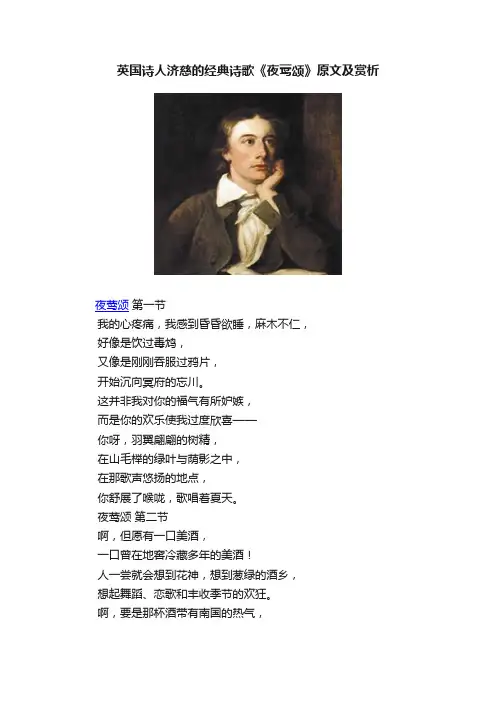
英国诗人济慈的经典诗歌《夜莺颂》原文及赏析夜莺颂第一节我的心疼痛,我感到昏昏欲睡,麻木不仁,好像是饮过毒鸩,又像是刚刚吞服过鸦片,开始沉向冥府的忘川。
这并非我对你的福气有所妒嫉,而是你的欢乐使我过度欣喜——你呀,羽翼翩翩的树精,在山毛榉的绿叶与荫影之中,在那歌声悠扬的地点,你舒展了喉咙,歌唱着夏天。
夜莺颂第二节啊,但愿有一口美酒,一口曾在地窖冷藏多年的美酒!人一尝就会想到花神,想到葱绿的酒乡,想起舞蹈、恋歌和丰收季节的欢狂。
啊,要是那杯酒带有南国的热气,红如人面,充满灵感之泉的真味,珍珠的泡沫在杯沿浮动,能把嘴唇染得绯红,我就会一饮而尽,悄然离开尘寰,随你隐没在幽暗的林间。
夜莺颂第三节远远地隐没,消失,并且忘记你在林间从不知晓的东西,忘记这里的厌倦、焦虑和烦躁不安。
这里,人们坐在一起长吁短叹;这里,老年瘫痪了,只剩得几根白发摇晃,青年也变得苍白,瘦削,以至死亡;这里,人们一思想就感到伤悲,就会绝望得两眼铅灰;这里,美人的双眸难以保持明丽,新生的爱情第二天就会凋敝。
夜莺颂第四节飞去,飞去,我要向你飞去,不是与酒神同驾豹车而去,而是乘坐诗神的无形的双翼,尽管这头脑恁地迟钝、团惑和呆滞。
啊,此刻我终于和你在一起了;夜,是这般地柔和,也许月后已经登上宝座,众星正在四周守望,但是,这里却没有光亮,除了几丝天光,随风穿过窗枝的隙缝,穿过绿叶的荫影和苔藓的曲径。
夜莺颂第五节我看不清什么花儿在我脚下,也望不见什么花儿在枝头挂,但是,在温馨的黑夜,我却能猜想这个季节的每一种芬芳,那就该有香草、灌木和野果树的花。
有山楂和野玫瑰的花,还有早谢的紫罗兰为绿叶遮盖,还有麝香蔷薇即将盛开——那种蔷薇是五月中旬的骄儿,流露着酒香,它是夏夜蚊蝇飞鸣的地方。
夜莺颂第六节我在黑暗中倾听你的歌声,我多次想到死亡,他可以给人安宁。
我在诗歌里亲昵地向他呼唤,求他把我的生命化为青烟。
现在我越发感到死亡的富丽,想在午夜安然地与世别离,但此刻你却以如此的狂喜倾吐着你的胸臆,你将永远歌唱不息,我死了就不会再听见你——你将唱给一堆草泥。
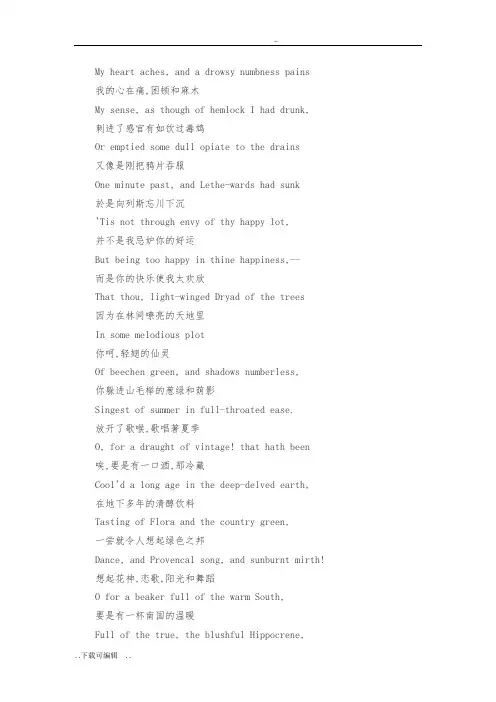
My heart aches, and a drowsy numbness pains我的心在痛,困顿和麻木My sense, as though of hemlock I had drunk,刺进了感官有如饮过毒鸩Or emptied some dull opiate to the drains又像是刚把鸦片吞服One minute past, and Lethe-wards had sunk於是向列斯忘川下沉'Tis not through envy of thy happy lot,并不是我忌妒你的好运But being too happy in thine happiness,--而是你的快乐使我太欢欣That thou, light-winged Dryad of the trees因为在林间嘹亮的天地里In some melodious plot你呵,轻翅的仙灵Of beechen green, and shadows numberless,你躲进山毛榉的葱绿和荫影Singest of summer in full-throated ease.放开了歌喉,歌唱著夏季O, for a draught of vintage! that hath been 唉,要是有一口酒,那冷藏Cool'd a long age in the deep-delved earth,在地下多年的清醇饮料Tasting of Flora and the country green,一尝就令人想起绿色之邦Dance, and Provencal song, and sunburnt mirth! 想起花神,恋歌,阳光和舞蹈O for a beaker full of the warm South,要是有一杯南国的温暖Full of the true, the blushful Hippocrene,充满了鲜红的灵感之泉With beaded bubbles winking at the brim,杯缘明灭著珍珠的泡沫And purple-stained mouth给嘴唇染上紫斑That I might drink, and leave the world unseen,我要一饮而尽而悄然离开尘寰And with thee fade away into the forest dim和你同去幽暗的林中隐没Fade far away, dissolve, and quite forget远远地,远远隐没,让我忘掉What thou among the leaves hast never known,你在树叶间从不知道的一切The weariness, the fever, and the fret忘记这疲劳,热病,和焦躁Here, where men sit and hear each other groan;这使人对坐而悲叹的世界Where palsy shakes a few, sad, last gray hairs,在这里,青春,苍白,削瘦,死亡Where youth grows pale, and spectre-thin, and dies; 而瘫痪有几根白发在摇摆Where but to think is to be full of sorrow在这里,稍一思索就充满了And leaden-eyed despairs,忧伤和灰暗的绝望Where Beauty cannot keep her lustrous eyes,而美保持不住明眸的光彩Or new Love pine at them beyond to-morrow.新生的爱情活不到明天就枯凋Away! away! for I will fly to thee,去吧!去吧!我要朝你飞去Not charioted by Bacchus and his pards,不用和酒神坐文豹的车驾But on the viewless wings of Poesy,我要展开诗歌底无形的羽翼Though the dull brain perplexes and retards尽管这头脑已经困顿,疲乏Already with thee! tender is the night,去了,我已经和你同往And haply the Queen-Moon is on her throne,夜这般温柔,月后正登上宝座Cluster'd around by all her starry Fays;周围是侍卫她的一群星星But here there is no light,但这儿不甚明亮Save what from heaven is with the breezes blown 除了有一线天光,被微风带过Through verdurous glooms and winding mossy ways. 葱绿的幽暗和藓苔的曲径I cannot see what flowers are at my feet,我看不出是哪种花在脚旁Nor what soft incense hangs upon the boughs,什麼清香的花挂在树枝上But, in embalmed darkness, guess each sweet在温馨的幽暗理,我只能猜想Wherewith the seasonable month endows这时令该把哪种芬芳The grass, the thicket, and the fruit-tree wild; 赋予这果树,林莽和草丛White hawthorn, and the pastoral eglantine;这白枳花,和田野的玫瑰Fast fading violets cover'd up in leaves;这绿叶堆中易凋谢的紫罗兰And mid-May's eldest child,还有五月中旬的娇宠The coming musk-rose, full of dewy wine,这缀满了露酒的麝香蔷薇The murmurous haunt of flies on summer eves.它成了夏夜蚊蚋嗡营的港湾Darkling I listen; and, for many a time我在黑暗中里倾听,多少次I have been half in love with easeful Death,我几乎爱上了静谧的死亡Call'd him soft names in many a mused rhyme,我在诗思里用尽了我言辞To take into the air my quiet breath;求他把我的一息散入空茫Now more than ever seems it rich to die,而现在,死更是多麼的富丽To cease upon the midnight with no pain,在午夜里溘然魂离人间While thou art pouring forth thy soul abroad当你正倾泻你的心怀In such an ecstasy!发出这般的狂喜Still wouldst thou sing, and I have ears in vain-- 你仍将歌唱,但我却不再听To thy high requiem become a sod.你的莽歌只能唱给泥草一块Thou wast not born for death, immortal Bird!永生的鸟啊,你不会死去No hungry generations tread thee down;饿的世代无法将你蹂躏The voice I hear this passing night was heard今夜,我偶然听到的歌曲In ancient days by emperor and clown:当使古代的帝王和村夫喜悦Perha ps the self-same song that found a path或许这同样的歌也曾激荡Through the sad heart of Ruth, when, sick for home, 露丝忧郁的心,使她不禁落泪She stood in tears amid the alien corn;站在异邦的谷田里想著家The same that oft-times hath就是这声音常常Charm'd magic casements, opening on the foam在失掉了的仙域里引动窗扉Of perilous seas, in faery lands forlorn.一个美女望著大海险恶的浪花Forlorn! the very word is like a bell失掉了,这句话好比一声钟To toll me back from thee to my sole self!使我猛省到我站脚的地方Adieu! the fancy cannot cheat so well别了!幻想,这骗人的妖童As she is fam'd to do, deceiving elf.不能老耍弄它盛传的伎俩Adieu! adieu! thy plaintive anthem fades别了!别了!你怨诉的歌声Past the near meadows, over the still stream,流过草坪,越过幽静的溪水Up the hill-side; and now 'tis buried deep溜上山坡,而此时它正深深In the next valley-glades:埋在附近的溪谷中Was it a vision, or a waking dream?这是个幻觉,还是梦寐Fled is that music:--Do I wake or sleep? 那歌声去了——我是睡?是醒?。
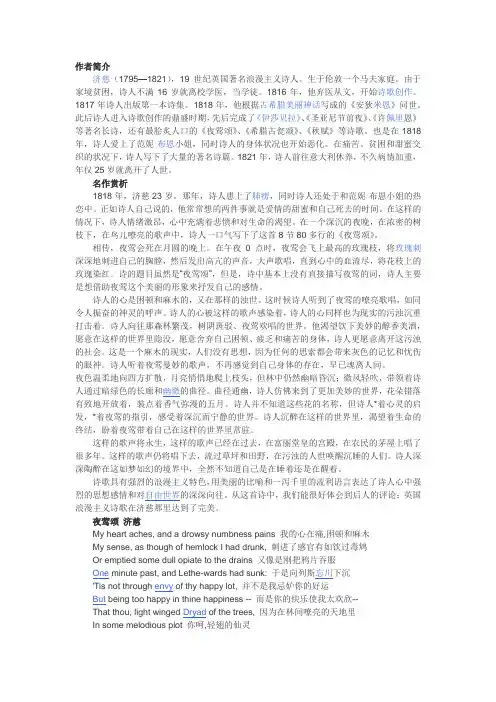
作者简介济慈(1795—1821),19世纪英国著名浪漫主义诗人。
生于伦敦一个马夫家庭。
由于家境贫困,诗人不满16岁就离校学医,当学徒。
1816年,他弃医从文,开始诗歌创作。
1817年诗人出版第一本诗集。
1818年,他根据古希腊美丽神话写成的《安狄米恩》问世。
此后诗人进入诗歌创作的鼎盛时期,先后完成了《伊莎贝拉》、《圣亚尼节前夜》、《许佩里恩》等著名长诗,还有最脍炙人口的《夜莺颂》、《希腊古瓮颂》、《秋赋》等诗歌。
也是在1818年,诗人爱上了范妮·布恩小姐,同时诗人的身体状况也开始恶化。
在痛苦、贫困和甜蜜交织的状况下,诗人写下了大量的著名诗篇。
1821年,诗人前往意大利休养,不久病情加重,年仅25岁就离开了人世。
名作赏析1818年,济慈23岁。
那年,诗人患上了肺痨,同时诗人还处于和范妮·布恩小姐的热恋中。
正如诗人自己说的,他常常想的两件事就是爱情的甜蜜和自己死去的时间。
在这样的情况下,诗人情绪激昂,心中充满着悲愤和对生命的渴望。
在一个深沉的夜晚,在浓密的树枝下,在鸟儿嘹亮的歌声中,诗人一口气写下了这首8节80多行的《夜莺颂》。
相传,夜莺会死在月圆的晚上。
在午夜0点时,夜莺会飞上最高的玫瑰枝,将玫瑰刺深深地刺进自己的胸膛,然后发出高亢的声音,大声歌唱,直到心中的血流尽,将花枝上的玫瑰染红。
诗的题目虽然是“夜莺颂”,但是,诗中基本上没有直接描写夜莺的词,诗人主要是想借助夜莺这个美丽的形象来抒发自己的感情。
诗人的心是困顿和麻木的,又在那样的浊世。
这时候诗人听到了夜莺的嘹亮歌唱,如同令人振奋的神灵的呼声。
诗人的心被这样的歌声感染着,诗人的心同样也为现实的污浊沉重打击着。
诗人向往那森林繁茂,树阴斑驳、夜莺欢唱的世界。
他渴望饮下美妙的醇香美酒,愿意在这样的世界里隐没,愿意舍弃自己困顿、疲乏和痛苦的身体,诗人更愿意离开这污浊的社会。
这是一个麻木的现实,人们没有思想,因为任何的思索都会带来灰色的记忆和忧伤的眼神。
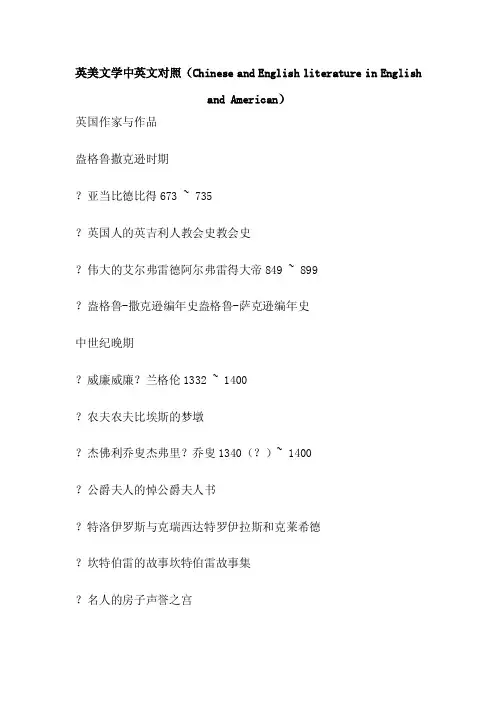
英美文学中英文对照(Chinese and English literature in Englishand American)英国作家与作品盎格鲁撒克逊时期亚当比德比得673 ~ 735英国人的英吉利人教会史教会史伟大的艾尔弗雷德阿尔弗雷得大帝849 ~ 899盎格鲁-撒克逊编年史盎格鲁-萨克逊编年史中世纪晚期威廉威廉兰格伦1332 ~ 1400农夫农夫比埃斯的梦墩杰佛利乔叟杰弗里乔叟1340(?)~ 1400公爵夫人的悼公爵夫人书特洛伊罗斯与克瑞西达特罗伊拉斯和克莱希德坎特伯雷的故事坎特伯雷故事集名人的房子声誉之宫托马斯爵士马洛托马斯马洛里爵士1405 ~ 1471 亚瑟之死亚瑟王之死文艺复兴菲利普先生,悉尼菲利普锡德尼爵士1554 ~ 1586 滥用诲淫的学校学校诗歌诗辩防御埃德蒙斯宾塞埃德蒙斯宾塞1552 ~ 1599牧羊人的日历牧人日历小爱神爱情小唱婚后曲颂歌柯林回家了柯林呢克劳特回来了四hymnes四首赞美歌仙后仙后托马斯更托马斯莫尔1478 ~ 1535乌托邦乌托邦弗兰西斯培根弗兰西斯培根1561 ~ 1626学习学术的推进进步新工具新工具文章随笔克里斯托弗马洛柯里斯托弗马洛1564 ~ 1595 帖木儿帖木耳大帝马耳他马耳他的犹太人犹太人浮士德博士的悲剧历史浮士德博士的悲剧威廉莎士比亚威廉莎士比亚1564 ~ 1616 Romeo和朱丽叶罗密欧与朱利叶威尼斯威尼斯商人商人亨利四世亨利四世尤利乌斯凯撒尤利乌斯凯撒只要你喜欢皆大欢喜哈姆雷特哈姆莱特奥瑟罗奥赛罗李尔王李尔王麦克白麦克白Antony和克利奥帕特拉安东尼与克里奥佩特拉暴风雨暴风雨诗歌:维纳斯和阿多尼斯;强奸Lucrece(金星和卢克莱修);热情的朝圣者,十四行诗十七世纪密尔顿约翰弥尔顿1608 ~ 1674l'allegre欢乐的人白细胞介素笔eroso沉思的人该柯玛斯利西达斯利西达斯教育论教育自由论出版自由英国人的为英国人民声辩辩护英国人的再为英国人民声辩二防御失乐园失乐园复乐园乐园参孙力士参孙约翰班扬约翰班扬1628 ~ 1688丰盛的恩典的罪人功德无量首席天路历程天路历程对罪犯败德先生传生死的圣战圣战德莱顿约翰德莱顿1631 ~ 1700一切为了爱一切为了爱情押沙龙与阿齐托菲尔押沙龙与阿齐托菲尔Hind和黑豹牝鹿与豹奇迹年神奇的年代亚力山大的盛宴亚历山大的宴会戏剧诗歌论戏剧诗随笔十八世纪亚力山大教皇亚历山大蒲柏1688 ~ 1744 在批评论散文批评道德论道德论上一篇文章的人人论岩石的卷发遇劫记强奸愚人记Dunciad塞缪尔·强森塞缪尔约翰逊1709 ~ 1784 英语语言英语辞典字典人类的愿望人类欲望之虚幻虚荣伦敦伦敦大诗人诗人传生活乔纳森迅速乔纳森斯威夫特1667 ~ 1745 书书战战斗一个浴缸木桶的故事故事的德拉珀的信一个麻布商的书信一个小小的建议一个小小的建议格列佛游记格列佛游记丹尼尔笛福丹尼尔笛福1660 ~ 1731审查(期刊由笛福创办)评论报鲁滨孙漂流记鲁宾逊漂流记亨利·菲尔丁亨利菲尔丁1707 ~ 1754Joseph Andrews的约瑟夫冒险史吗?安德鲁Jonathan Wild先生的一生,伟大的大诗人江奈生?威尔德阿米莉亚爱米利亚汤姆琼斯的历史,一个弃儿汤姆琼斯1736一七三六年历史记事历史登记Don Quixote在英国堂吉柯德在英国塞缪尔理查德森塞缪尔理查逊1689 ~ 1761帕梅拉(凭借奖励)帕米拉奥利弗史密斯奥利弗格尔德斯密斯1730 ~ 1774旅行者旅游人废弃的村庄荒村威克菲尔德牧师传威克菲尔德牧师好脾气的人好心人她弯下腰去征服屈身求爱全世界的公民世界公民托马斯灰色托马斯格雷1716 ~ 1771写在教堂墓地墓园挽诗挽歌颂爱猫爱猫之死死亡诗人游吟诗人李察比谢里丹理查德布林斯利施莱登1751 ~ 1816 竞争对手情敌该丑闻造谣学校学校圣帕特里克节(策划圣中尉)派特立克节伴娘女佣评论家批评家浪漫主义时代罗伯特伯恩斯罗伯特彭斯1759 ~ 1796主要是在苏格兰方言主要用苏格兰方言写的诗诗John Anderson,我的爱人约翰?安德生,我的爱人红色,红色的玫瑰一朵红红的玫瑰”友谊地久天长”的往昔时光一个男人的男人a'that不管那一套我心在高地我的心在那高原上威廉布莱克威廉布莱克1757 ~ 1827天真天真之歌歌曲经验经验之歌歌曲美国亚美利加欧洲欧罗巴密尔顿弥尔顿耶路撒冷耶路撒冷天堂和地狱天堂与地狱的婚姻婚姻威廉华兹华斯威廉华兹华斯1770 ~ 1850我们是七我们是七个孤独的收割者孤独的割麦女从早期的童年回忆不朽颂不朽的仿制品序曲的前奏抒情歌谣抒情歌谣集塞缪尔泰勒柯勒律治塞缪尔泰勒科尔律治1772 ~ 1834 古代水手的古舟子颂雾凇克丽丝特布尔柯里斯塔贝尔Kubla Khan忽必烈汗晚上半夜冰霜霜忧郁颂忧郁颂文学传记文学传记乔治戈登拜伦乔治戈登拜伦1788 ~ 1824Childe Harold的朝圣恰尔德?哈罗德尔游记曼弗雷德曼弗雷德该隐该隐不唐胡安璜当我们分开的时候当初我们俩分别波西比希雪莱波西比希雪莱1792 ~ 1822 麦布女王麦步女王伊斯兰教伊斯兰的反叛反抗钦契钦契一家无政府主义的面具,希腊专制者的假面游行解放了的普罗米修斯解放了的普罗米修斯西风颂西风颂云雀致云雀济慈约翰济慈1795 ~ 1821在希腊古瓮希腊古瓮颂夜莺颂夜莺颂秋颂秋颂心灵普塞克颂在Chapman的第一初读查普曼翻译的荷马史诗有感寻找荷马沃尔特史葛沃尔特斯科特爵士1771 ~ 1832湖的湖上夫人女士韦弗利威弗利人盖曼纳令曼纳林罗布罗伊罗伯罗伊艾文霍艾凡赫Kenilworth肯纳尔沃斯堡昆廷杜沃昆廷达沃德圣罗南的威尔斯圣罗南之泉简奥斯丁简奥斯丁1775 ~ 1817理智与情感理智与情感傲慢与偏见傲慢与偏见曼斯菲尔德公园曼斯菲尔德庄园艾玛爱玛诺桑觉寺诺桑觉寺说服劝导查尔斯查尔斯羔羊兰姆1775 ~ 1834从莎士比亚莎士比亚戏剧故事集故事约翰伍德威尔约翰伍德维尔维多利亚时期英文查尔斯狄更斯查尔斯狄更斯1812 ~ 1870 波兹特写BOZ素描“匹克威克俱乐部匹克威克外传遗书奥利弗扭奥利弗特维斯特(雾都孤儿)老古玩店老古玩店拉奇巴纳比拉奇美国债券美国杂记马丁·霍述伟马丁朱淑尔维特圣诞颂歌圣诞颂歌风铃教堂钟声在炉边灶上蟋蟀蟋蟀Dombey和儿子董贝父子大卫·科波菲尔大卫科波菲尔荒凉山庄荒凉山庄困难时期艰难时世小杜丽小杜丽两个城市双城记故事很大的期望远大前程我们共同的朋友我们共同的朋友埃德温drood艾德温?朱特威廉皮斯萨克雷威廉麦克匹斯萨克雷1811 ~ 1863 名利场名利场潘登尼斯潘登尼斯新来的纽克姆一家亨利埃斯蒙德亨利史吗埃斯蒙德勃朗特夏洛蒂勃朗特1816 ~ 1855教师教授简爱简爱雪莉雪莉维莱特维莱特艾米丽勃朗特艾米莉勃朗特1818 ~ 1854 呼啸山庄呼啸山庄george eliot乔治? 艾略特1819 ~ 1880 adam bede亚当? 比德the mill on the floss弗洛斯河上的磨坊 silas marner织工马南romola罗慕拉holt菲利克斯 felix? 霍尔特middlemarch米德尔马契daniel deronda丹尼尔? 德龙拉thomas hardy托马斯? 哈代1840 ~ 1928a pair of blue eyes一双蓝眼睛the trumpet major号兵长the remedies非常手段the hand of ethelberta艾塞尔伯塔的婚姻under the greenwood tree绿荫下far from the madding crowd远离尘嚣the mayor of casterbridge卡斯特桥市长tess of the d 'urbervilles德伯家的苔丝jude the obscure无名的裘德alfred tennyson阿尔弗莱德? 丁尼生1809 ~ 1892 in memoriam悼念break, break, break冲击、冲击、冲击idylls of the king国王叙事诗robert browning罗伯特? 白朗宁1812 ~ 1889dramatic lyrics戏剧抒情诗dramatic romances and lyrics戏剧故事及抒情诗men, men, men, and women男男女女dramatic personae登场人物the ring and the book环与书elizabeth barrett browning伊丽莎白? 芭蕾特? 白朗宁1806 ~ 1861from the portuguese葡萄牙十四行诗 sonnetsthe cry of the children孩子们的哭声john ruskin约翰? 罗斯金1819 ~ 1900modern painters现代画家the seven lamps of architecture建筑的七盏明灯the stone of venice威尼斯石头oscar wilde奥斯卡? 王尔德1856 ~ 1900the happy prince and other tales快乐王子故事集the picture of dorian gray多利安? 格雷的画像lady windermere's fan温德米尔夫人的扇子a woman of no importance一个无足轻重的女人an ideal husband理想的丈夫the importance of being earnest认真的重要1900 - 1950william butler yeats威廉? 勃特勒? 叶茨1865 ~ 1939 the responsibilities责任the wild swans at coole库尔的野天鹅the tower钟楼the winding stair弯弯的楼梯john galsworthy约翰? 高尔斯华绥1867 ~ 1933forsyte saga福尔塞世家the man of property有产业的人in chancery进退维谷to let招租出让the end of the chapter一章的结束james joyce詹姆斯? 乔伊斯1882 ~ 1941the portrait of the young artis as the man一个青年艺术家的肖像ulysses尤利西斯finnegans wake芬尼根的苏醒dubliners都柏林人virginia woolf弗吉尼娅? 沃尔芙1882 ~ 1941mrs. dalloway达洛维夫人to the lighthouse到灯塔去the waves浪david herbert lawrence戴维? 赫伯特? 劳伦斯1885 ~ 1930sons and lovers儿子与情人the rainbow虹women in love恋爱中的女人lady chatterley 's lover查特莱夫人的情人george bernard shaw乔治? 伯纳? 萧1856 ~ 1950mrs warren's profession华伦夫人的职业 man and superman人与超人major barbara巴巴拉少校pygmalion匹格玛利翁房子伤心之家心碎苹果车苹果车圣女贞德圣女贞德美国作家与作品殖民时代乔纳森爱德华兹乔纳森爱德华兹1703 ~ 1758 的自由将意志的自由原罪的伟大主义辩护原罪说辩本杰明富兰克林本杰明富兰克林1706 ~ 1790 可怜的李察的年历格言历书自传自传浪漫主义时期华盛顿欧文华盛顿欧文纽约的历史从世界开始到荷兰王朝纽约外史结束Geoffrey Crayon,速写本见闻札记绅士。
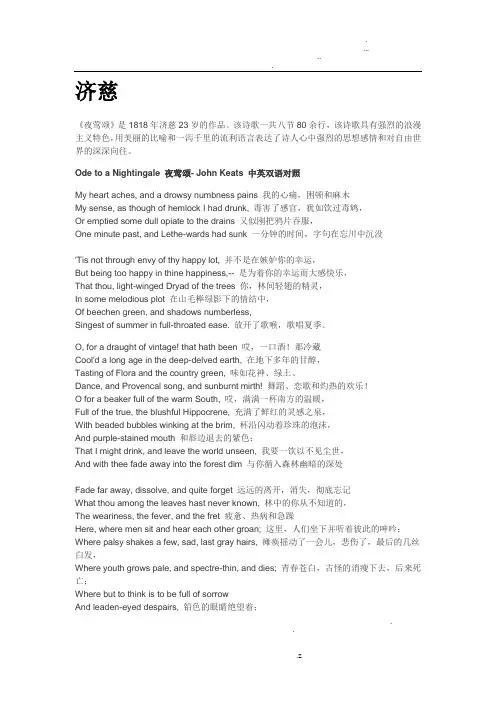
济慈《夜莺颂》是1818年济慈23岁的作品。
该诗歌一共八节80余行,该诗歌具有强烈的浪漫主义特色,用美丽的比喻和一泻千里的流利语言表达了诗人心中强烈的思想感情和对自由世界的深深向往。
Ode to a Nightingale 夜莺颂- John Keats 中英双语对照My heart aches, and a drowsy numbness pains 我的心痛,困顿和麻木My sense, as though of hemlock I had drunk, 毒害了感官,犹如饮过毒鸩,Or emptied some dull opiate to the drains 又似刚把鸦片吞服,One minute past, and Lethe-wards had sunk 一分钟的时间,字句在忘川中沉没'Tis not through envy of thy happy lot, 并不是在嫉妒你的幸运,But being too happy in thine happiness,-- 是为着你的幸运而大感快乐,That thou, light-winged Dryad of the trees 你,林间轻翅的精灵,In some melodious plot 在山毛榉绿影下的情结中,Of beechen green, and shadows numberless,Singest of summer in full-throated ease. 放开了歌喉,歌唱夏季。
O, for a draught of vintage! that hath been 哎,一口酒!那冷藏Cool'd a long age in the deep-delved earth, 在地下多年的甘醇,Tasting of Flora and the country green, 味如花神、绿土、Dance, and Provencal song, and sunburnt mirth! 舞蹈、恋歌和灼热的欢乐!O for a beaker full of the warm South, 哎,满满一杯南方的温暖,Full of the true, the blushful Hippocrene, 充满了鲜红的灵感之泉,With beaded bubbles winking at the brim, 杯沿闪动着珍珠的泡沫,And purple-stained mouth 和唇边退去的紫色;That I might drink, and leave the world unseen, 我要一饮以不见尘世,And with thee fade away into the forest dim 与你循入森林幽暗的深处Fade far away, dissolve, and quite forget 远远的离开,消失,彻底忘记What thou among the leaves hast never known, 林中的你从不知道的,The weariness, the fever, and the fret 疲惫、热病和急躁Here, where men sit and hear each other groan; 这里,人们坐下并听着彼此的呻吟;Where palsy shakes a few, sad, last gray hairs, 瘫痪摇动了一会儿,悲伤了,最后的几丝白发,Where youth grows pale, and spectre-thin, and dies; 青春苍白,古怪的消瘦下去,后来死亡;Where but to think is to be full of sorrowAnd leaden-eyed despairs, 铅色的眼睛绝望着;..Where Beauty cannot keep her lustrous eyes, 美人守不住明眸,Or new Love pine at them beyond to-morrow. 新的恋情过不完明天。
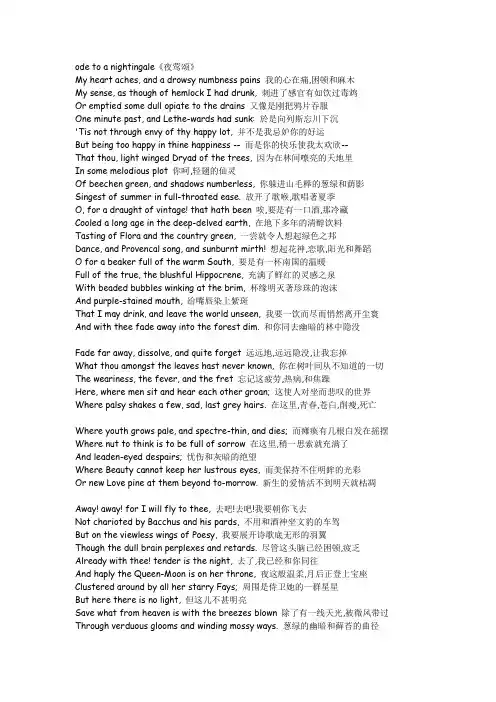
ode to a nightingale《夜莺颂》My heart aches, and a drowsy numbness pains 我的心在痛,困顿和麻木My sense, as though of hemlock I had drunk, 刺进了感官有如饮过毒鸩Or emptied some dull opiate to the drains 又像是刚把鸦片吞服One minute past, and Lethe-wards had sunk: 於是向列斯忘川下沉'Tis not through envy of thy happy lot, 并不是我忌妒你的好运But being too happy in thine happiness -- 而是你的快乐使我太欢欣--That thou, light winged Dryad of the trees, 因为在林间嘹亮的天地里In some melodious plot 你呵,轻翅的仙灵Of beechen green, and shadows numberless, 你躲进山毛榉的葱绿和荫影Singest of summer in full-throated ease. 放开了歌喉,歌唱著夏季O, for a draught of vintage! that hath been 唉,要是有一口酒,那冷藏Cooled a long age in the deep-delved earth, 在地下多年的清醇饮料Tasting of Flora and the country green, 一尝就令人想起绿色之邦Dance, and Provencal song, and sunburnt mirth! 想起花神,恋歌,阳光和舞蹈O for a beaker full of the warm South, 要是有一杯南国的温暖Full of the true, the blushful Hippocrene, 充满了鲜红的灵感之泉With beaded bubbles winking at the brim, 杯缘明灭著珍珠的泡沫And purple-stained mouth, 给嘴唇染上紫斑That I may drink, and leave the world unseen, 我要一饮而尽而悄然离开尘寰And with thee fade away into the forest dim. 和你同去幽暗的林中隐没Fade far away, dissolve, and quite forget 远远地,远远隐没,让我忘掉What thou amongst the leaves hast never known, 你在树叶间从不知道的一切The weariness, the fever, and the fret 忘记这疲劳,热病,和焦躁Here, where men sit and hear each other groan; 这使人对坐而悲叹的世界Where palsy shakes a few, sad, last grey hairs. 在这里,青春,苍白,削瘦,死亡Where youth grows pale, and spectre-thin, and dies; 而瘫痪有几根白发在摇摆Where nut to think is to be full of sorrow 在这里,稍一思索就充满了And leaden-eyed despairs; 忧伤和灰暗的绝望Where Beauty cannot keep her lustrous eyes, 而美保持不住明眸的光彩Or new Love pine at them beyond to-morrow. 新生的爱情活不到明天就枯凋Away! away! for I will fly to thee, 去吧!去吧!我要朝你飞去Not charioted by Bacchus and his pards, 不用和酒神坐文豹的车驾But on the viewless wings of Poesy, 我要展开诗歌底无形的羽翼Though the dull brain perplexes and retards. 尽管这头脑已经困顿,疲乏Already with thee! tender is the night, 去了,我已经和你同往And haply the Queen-Moon is on her throne, 夜这般温柔,月后正登上宝座Clustered around by all her starry Fays; 周围是侍卫她的一群星星But here there is no light, 但这儿不甚明亮Save what from heaven is with the breezes blown 除了有一线天光,被微风带过Through verduous glooms and winding mossy ways. 葱绿的幽暗和藓苔的曲径I cannot se what flowers are at my feet, 我看不出是哪种花在脚旁Nor what soft incense hangs upon the boughs, 什麼清香的花挂在树枝上But, in embalmed darkness, guess each sweet 在温馨的幽暗理,我只能猜想Wherewith the seasonable month endows 这时令该把哪种芬芳The grass, the thicket, and the fruit-tree wild -- 赋予这果树,林莽和草丛White hawthorn, and the pastoral eglantine; 这白枳花,和田野的玫瑰Fast fading violets covered up in leaves; 这绿叶堆中易凋谢的紫罗兰And mid-May's eldest child, 还有五月中旬的娇宠The coming musk-rose, full of dewy wine, 这缀满了露酒的麝香蔷薇The murmurous haunt of flies on summer eves. 它成了夏夜蚊蚋嗡营的港湾Darkling I listen; and for many a time 我在黑暗中里倾听,多少次I have been half in love with easeful Death, 我几乎爱上了静谧的死亡Called him soft names in many a mused rhyme, 我在诗思里用尽了我言辞To take into the air my quiet breath; 求他把我的一息散入空茫Now more than ever seems it rich to die, 而现在,死更是多麼的富丽To cease upon the midnight with no pain, 在午夜里溘然魂离人间While thou art pouring forth thy soul abroad 当你正倾泻你的心怀In such an ecstasy! 发出这般的狂喜Still wouldst thou sing, and I have ears in vain -- 你仍将歌唱,但我却不再听?To thy high requiem become a sod. 你的莽歌只能唱给泥草一块Thou wast not born for death, immortal Bird! 永生的鸟,你不会死去No hungry generations tread thee down; 饿的世代无法将你蹂躏The voice I hear this passing night eas heard 今夜,我偶然听到的歌曲In ancient days by emperor and clown: 当使古代的帝王和村夫喜悦Perhaps the self-same song that found a path 或许这同样的歌也曾激荡Through the sad heart of Ruth, when, sick for home, 露丝忧郁的心,使她不禁落泪She stood in tears amid the alien corn; 站在异邦的谷田里想著家The same that oft-times hath 就是这声音常常Charmed magic casements, opening on the foam 在失掉了的仙域里引动窗扉Of perilous seas, in faery lands forlorn. 一个美女望著大海险恶的浪花Forlorn! the very word is like a bell 失掉了,这句话好比一声钟To toll me back from thee to my sole self! 使我猛省到我站脚的地方Adieu! the fancy cannot cheat so well 别了!幻想,这骗人的妖童As she is famed to do, deceiving elf. 不能老耍弄它盛传的伎俩Adieu! adieu! thy plaintive anthem fades 别了!别了!你怨诉的歌声Past the near meadows, over the still stream, 流过草坪,越过幽静的溪水Up the hill-side; and now 'tis buried deep 溜上山坡,而此时它正深深In the next valley-glades: 埋在附近的溪谷中Was is a vision, or a waking dream? 这是个幻觉,还是梦寐Fled is that music -- Do I wake or sleep? 那歌声去了-我是睡?是醒?作品赏析相传,夜莺会死在月圆的晚上。
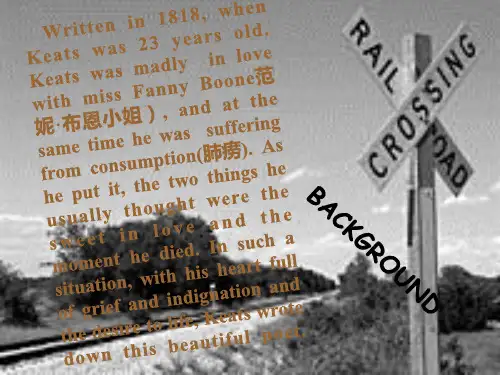
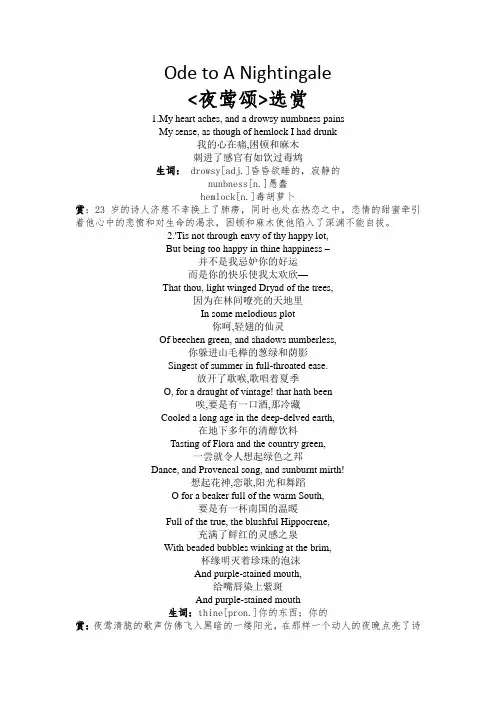
Ode to A Nightingale<夜莺颂>选赏1.My heart aches, and a drowsy numbness painsMy sense, as though of hemlock I had drunk我的心在痛,困顿和麻木刺进了感官有如饮过毒鸩生词:drowsy[adj.]昏昏欲睡的,寂静的nunbness[n.]愚蠢hemlock[n.]毒胡萝卜赏:23岁的诗人济慈不幸换上了肺痨,同时也处在热恋之中,恋情的甜蜜牵引着他心中的悲愤和对生命的渴求,困顿和麻木使他陷入了深渊不能自拔。
2.'Tis not through envy of thy happy lot,But being too happy in thine happiness –并不是我忌妒你的好运而是你的快乐使我太欢欣—That thou, light winged Dryad of the trees,因为在林间嘹亮的天地里In some melodious plot你呵,轻翅的仙灵Of beechen green, and shadows numberless,你躲进山毛榉的葱绿和荫影Singest of summer in full-throated ease.放开了歌喉,歌唱着夏季O, for a draught of vintage! that hath been唉,要是有一口酒,那冷藏Cooled a long age in the deep-delved earth,在地下多年的清醇饮料Tasting of Flora and the country green,一尝就令人想起绿色之邦Dance, and Provencal song, and sunburnt mirth!想起花神,恋歌,阳光和舞蹈O for a beaker full of the warm South,要是有一杯南国的温暖Full of the true, the blushful Hippocrene,充满了鲜红的灵感之泉With beaded bubbles winking at the brim,杯缘明灭着珍珠的泡沫And purple-stained mouth,给嘴唇染上紫斑And purple-stained mouth生词:thine[pron.]你的东西;你的赏:夜莺清脆的歌声仿佛飞入黑暗的一缕阳光,在那样一个动人的夜晚点亮了诗人的心灵。
The speaker opens with a declaration of his own heartache. He feels numb, as though he had taken a drug only a moment ago. He is addressing a nightingale he hears singing somewhere in the forest and says that his “drowsy numbness” is not from envy of the nightingale’s happiness, but rather from sharing it too completely; he is “too happy” that the nightingale sings the music of summer from amid some unseen plot of green trees and shadows.In the second stanza, the speaker longs for the oblivion of alcohol, expressing his wish for wine, “a draught of vintage,” that would taste like the country and like peasant dances, and let him “leave the world unseen” and disappear into the dim forest with the nightingale. In the third stanza, he explains his desire to fade away, saying he would like to forget the troubles the nightingale has never known: “the weariness, the fever, and the fret” of human life, with its consciousness that everything is mortal and nothing lasts. Youth “grows pale, and spectre-thin, and dies,” and “beauty cannot keep her lustrous eyes.”In the fourth stanza, the speaker tells the nightingale to fly away, and he will follow, not through alcohol (“Not charioted by Bacchus and his pards”), but through poetry, which will give him “viewless wings.” He says he is already with the nightingale and describes the forest glade, where even the moonlight is hidden by the trees, except the light that breaks through when the breezes blow the branches. In the fifth stanza, the speaker says that he ca nnot see the flowers in the glade, but can guess them “in embalmed darkness”: white hawthorne, eglantine, violets, and the musk-rose, “the murmurous haunt of flies on summer eves.” In the sixth stanza, the speaker listens in the dark to the nightingale, sa ying that he has often been “half in love” with the idea of dying and called Death soft names in many rhymes. Surrounded by the nightingale’s song, the speaker thinks that the idea of death seems richer than ever, and he longs to “cease upon the midnight with no pain” while the nightingale pours its soul ecstatically forth. If he were to die, the nightingale would continue to sing, he says, but he would “have ears in vain” and be no longer able to hear.In the seventh stanza, the speaker tells the nighting ale that it is immortal, that it was not “born for death.” He says that the voice he hears singing has always been heard, by ancient emperors and clowns, by homesick Ruth; he even says the song has often charmed open magic windows looking out over “the foa m / Of perilous seas, in faery lands forlorn.” In the eighth stanza, the word forlorn tolls like a bell to restore the speaker from his preoccupation with the nightingale and back into himself. As the nightingale flies farther away from him, he laments tha t his imagination has failed him and says that he can no longer recall whether the nightingale’s music was “a vision, or a waking dream.” Now that the music is gone, the speaker cannot recall whether he himself is awake or asleep.FormLike most of the ot her odes, “Ode to a Nightingale” is written in ten-line stanzas. However, unlike most of the other poems, it is metrically variable—though not so much as “Ode to Psyche.” The first seven and last two lines of each stanza are written in iambic pentameter; the eighth line of each stanza is written in trimeter, with only three accented syllables instead of five. “Nightingale” also differs from the other odes in that its rhyme scheme is the same in every stanza (every other ode varies the order of rhyme in the final three or four lines except “To Psyche,” which has the loosest structure of all the odes). Each stanza in “Nightingale” is rhymed ABABCDECDE, Keats’s most basic scheme throughout the odes.With “Ode to a Nightingale,” Keats’s speaker begins hi s fullest and deepest exploration of the themes of creative expression and the mortality of human life. In this ode, the transience of life and the tragedy of old age (“where palsy shakes a few, sad, last gray hairs, / Where youth grows pale, and spectre-t hin, and dies”) is set against the eternal renewal of the nightingale’s fluid music (“Thou wast not born for death, immortal bird!”). The speaker reprises the “drowsy numbness” he experienced in “Ode on Indolence,” but where in “Indolence” that numbness was a sign of disconnection from experience, in “Nightingale” it is a sign of too full a connection: “being too happy in thine happiness,” as the speaker tells the nightingale. Hearing the song of the nightingale, the speaker longs to flee the human world and join the bird. His first thought is to reach the bird’s state through alcohol—in the second stanza, he longs for a “draught of vintage” to transport him out of himself. But after his meditation in the third stanza on the transience of life, he rejects the idea of being “charioted by Bacchus and his pards” (Bacchus was the Roman god of wine and was supposed to have been carried by a chariot pulled by leopards) and chooses instead to embrace, for the first time since he refused to follow the figures in “Indolence,” “the viewless wings of Poesy.”The rapture of poetic inspiration matches the endless creative rapture of the nightingale’s music and lets the speaker, in stanzas five through seven, imagine himself with the bird in the darkened forest. The ecstatic music even encourages the speaker to embrace the idea of dying, of painlessly succumbing to death while enraptured by the nightingale’s music and never experiencing any further pain or disappointment. But when his meditation causes him to utter the wor d “forlorn,” he comes back to himself, recognizing his fancy for what it is—an imagined escape from the inescapable (“Adieu! the fancy cannot cheat so well / As she is fam’d to do, deceiving elf”). As the nightingale flies away, the intensity of the speaker’s experience has left him shaken, unable to remember whether he is awake or asleep.In “Indolence,” the speaker rejected all artistic effort. In “Psyche,” he was willing to embrace the creative imagination, but only for its own internal pleasures. But in the nightingale’s song, he finds a form of outward expression that translates the work of the imagination into the outside world, and this is the discovery that compels him to embrace Poesy’s “viewless wings” at last. The “art” of the nightingale is end lessly changeable and renewable; it is music without record, existing only in a perpetual present. As befits his celebration of music, the speaker’s language, sensually rich though it is, serves to suppress the sense of sight in favor of the other senses. He can imagine the light of the moon, “But here there is no light”; he knows he is surrounded by flowers, but he “cannot see what flowers” are at his feet. This suppression will find its match in “Ode on a Grecian Urn,” which is in many ways a companion poem to “Ode to a Nightingale.” In the later poem, the speaker will finally confront a created art-object not subject to any of the limitations of time; in “Nightingale,” he has achieved creative expression and has placed his faith in it, but that expression—the nightingale’s song—is spontaneous and without physical manifestation.。
Ode to a NightingaleSummaryThe speaker opens with a declaration of his own heartache. He feels numb, as though he had taken a drug only a moment ago. He is addressing a nightingale he hears singing somewhere in the forest and says that his "drowsy numbness" is not from envy of the nightingale's happiness, but rather from sharing it too completely; he is "too happy" that the nightingale sings the music of summer from amid some unseen plot of green trees and shadows.In the second stanza, the speaker longs for the oblivion of alcohol, expressing his wish for wine, "a draught of vintage," that would taste like the country and like peasant dances, and let him "leave the world unseen" and disappear into the dim forest with the nightingale. In the third stanza, he explains his desire to fade away, saying he would like to forget the troubles the nightingale has never known: "the weariness, the fever, and the fret" of human life, with its consciousness that everything is mortal and nothing lasts. Youth "grows pale, and spectre-thin, and dies," and "beauty cannot keep her lustrous eyes."In the fourth stanza, the speaker tells the nightingale to fly away, and he will follow, not through alcohol ("Not charioted by Bacchus and his pards"), but through poetry, which will give him "viewless wings." He says he is already with the nightingale and describes the forest glade, where even the moonlight is hidden by the trees, except the light that breaks through when the breezes blow the branches. In the fifth stanza, the speaker says that he cannot see the flowers in the glade, but can guess them "in embalmed darkness": white hawthorne, eglantine, violets, and the musk-rose, "the murmurous haunt of flies on summer eves." In the sixth stanza, the speaker listens in the dark to the nightingale, saying that he has often been "half in love" with the idea of dying and called Death soft names in many rhymes. Surrounded by the nightingale's song, the speaker thinks that the idea of death seems richer than ever, and he longs to "cease upon the midnight with no pain" while the nightingale pours its soul ecstatically forth. If he were to die, the nightingale would continue to sing, he says, but he would "have ears in vain" and be no longer able to hear.In the seventh stanza, the speaker tells the nightingale that it is immortal, that it was not "born for death." He says that the voice he hears singing has always been heard, by ancient emperors and clowns, by homesick Ruth; he even says the song has often charmed open magic windows looking out over "the foam / Of perilous seas, in faery lands forlorn." In the eighth stanza, the word forlorn tolls like a bell to restore the speaker from his preoccupation with the nightingale and back into himself. As the nightingale flies farther away from him, he laments that his imagination has failed him and says that he can no longer recall whether the nightingale's music was "a vision, or a waking dream." Now that the music is gone, the speaker cannot recall whether he himself is awake or asleep.FormLike most of the other odes, "Ode to a Nightingale" is written in ten-line stanzas. However, unlike most of the other poems, it is metrically variable--though not so much as "Ode to Psyche." The first seven and last two lines of each stanza are written in iambic pentameter; the eighth line of each stanza is written in trimeter, with only three accented syllables instead of five. "Nightingale" also differs from the other odes in that its rhyme scheme is the same in every stanza (every other ode varies the order of rhyme in the final three or four lines except "To Psyche," which has the loosest structure of all the odes). Each stanza in "Nightingale" is rhymed ABABCDECDE, Keats's most basic scheme throughout the odes.ThemesWith "Ode to a Nightingale," Keats's speaker begins his fullest and deepest exploration of the themes of creative expression and the mortality of human life. In this ode, the transience of life and the tragedy of old age ("where palsy shakes a few, sad, last gray hairs, / Where youth grows pale, and spectre-thin, and dies") is set against the eternal renewal of the nightingale's fluid music ("Thou wast not born for death, immortal bird!"). The speaker reprises the "drowsy numbness" he experienced in "Ode on Indolence," but where in "Indolence" that numbness was a sign of disconnection from experience, in "Nightingale" it is a sign of too full a connection: "being too happy in thine happiness," as the speaker tells the nightingale. Hearing the song of the nightingale, the speaker longs to flee the human world and join the bird. His first thought is to reach the bird's state through alcohol--in the second stanza, he longs for a "draught of vintage" to transport him out of himself. But after his meditation in the third stanza on the transience of life, he rejects the idea of being "charioted by Bacchus and his pards" (Bacchus was the Roman god of wine and was supposed to have been carried by a chariot pulled by leopards) and chooses instead to embrace, for the first time since he refused to follow the figures in "Indolence," "the viewless wings of Poesy."The rapture of poetic inspiration matches the endless creative rapture of the nightingale's music and lets the speaker, in stanzas five through seven, imagine himself with the bird in the darkened forest. The ecstatic music even encourages the speaker to embrace the idea of dying, of painlessly succumbing to death while enraptured by the nightingale's music and never experiencing any further pain or disappointment. But when his meditation causes him to utter the word "forlorn," he comes back to himself, recognizing his fancy for what it is--an imagined escape from the inescapable ("Adieu! the fancy cannot cheat so well / As she is fam'd to do, deceiving elf"). As the nightingale flies away, the intensity of the speaker's experience has left him shaken, unable to remember whether he is awake or asleep.In "Indolence," the speaker rejected all artistic effort. In "Psyche," he was willing to embrace the creative imagination, but only for its own internal pleasures. But in the nightingale's song, he finds a form of outward expression that translates the work of the imagination into the outside world, and this is the discovery that compels him to embrace Poesy's "viewless wings" at last. The "art" of the nightingale is endlessly changeable and renewable; it is music without record, existing only in a perpetual present. As befits his celebration of music, the speaker's language, sensually rich though it is, serves to suppress the sense of sight in favor of the other senses. He can imagine the light of themoon, "But here there is no light"; he knows he is surrounded by flowers, but he "cannot see what flowers" are at his feet. This suppression will find its match in "Ode on a Grecian Urn," which is in many ways a companion poem to "Ode to a Nightingale." In the later poem, the speaker will finally confront a created art-object not subject to any of the limitations of time; in "Nightingale," he has achieved creative expression and has placed his faith in it, but that expression--the nightingale's song--is spontaneous and without physical manifestation.。
Ode to a Nightingale by John Keats
译文:夜莺颂
I heard a nightingale singing
在幽暗的柏树下我坐着
In a dark and shadowy grove,
夜莺独鸣,四围灌木环绕
A voice so tremulous and true
它的歌声如泣如诉
That I could scarcely hear the note,
难以听见这音符
It was a melancholy strain
曲调忧郁哀愁
To haunt my woods by night alone,
孤独在夜晚萦绕在我树林中
And移民海外的日本艺人、音乐人或演员中,以流行歌手
最为常见。
许多日本流行歌手会以艺名或昵称进行音乐活动,其中一些艺人甚至会同时从事音乐、演艺和模特等多重职业。
在日本,偶像组合是乐坛主流,而单打独斗的歌手则相对较少。
济慈《夜莺颂》是1818年济慈23岁的作品。
该诗歌一共八节80余行,该诗歌具有强烈的浪漫主义特色,用美丽的比喻和一泻千里的流利语言表达了诗人心中强烈的思想感情和对自由世界的深深向往。
Ode to a Nightingale 夜莺颂- John Keats 中英双语对照My heart aches, and a drowsy numbness pains 我的心痛,困顿和麻木My sense, as though of hemlock I had drunk, 毒害了感官,犹如饮过毒鸩,Or emptied some dull opiate to the drains 又似刚把鸦片吞服,One minute past, and Lethe-wards had sunk 一分钟的时间,字句在忘川中沉没'Tis not through envy of thy happy lot, 并不是在嫉妒你的幸运,But being too happy in thine happiness,-- 是为着你的幸运而大感快乐,That thou, light-winged Dryad of the trees 你,林间轻翅的精灵,In some melodious plot 在山毛榉绿影下的情结中,Of beechen green, and shadows numberless,Singest of summer in full-throated ease. 放开了歌喉,歌唱夏季。
O, for a draught of vintage! that hath been 哎,一口酒!那冷藏Cool'd a long age in the deep-delved earth, 在地下多年的甘醇,Tasting of Flora and the country green, 味如花神、绿土、Dance, and Provencal song, and sunburnt mirth! 舞蹈、恋歌和灼热的欢乐!O for a beaker full of the warm South, 哎,满满一杯南方的温暖,Full of the true, the blushful Hippocrene, 充满了鲜红的灵感之泉,With beaded bubbles winking at the brim, 杯沿闪动着珍珠的泡沫,And purple-stained mouth 和唇边退去的紫色;That I might drink, and leave the world unseen, 我要一饮以不见尘世,And with thee fade away into the forest dim 与你循入森林幽暗的深处Fade far away, dissolve, and quite forget 远远的离开,消失,彻底忘记What thou among the leaves hast never known, 林中的你从不知道的,The weariness, the fever, and the fret 疲惫、热病和急躁Here, where men sit and hear each other groan; 这里,人们坐下并听着彼此的呻吟;Where palsy shakes a few, sad, last gray hairs, 瘫痪摇动了一会儿,悲伤了,最后的几丝白发,Where youth grows pale, and spectre-thin, and dies; 青春苍白,古怪的消瘦下去,后来死亡;Where but to think is to be full of sorrowAnd leaden-eyed despairs, 铅色的眼睛绝望着;Where Beauty cannot keep her lustrous eyes, 美人守不住明眸,Or new Love pine at them beyond to-morrow. 新的恋情过不完明天。
世界名著中英文对照A Doll's House《玩偶之家》(亨里克·易卜生,挪威)A Farewell to Arms《别了,武器》(海明威,美国)A Midsummer Night's Dream《仲夏夜之梦》(莎士比亚,英国)A Tale of Two Cities(《双城记》(查尔斯·狄更斯,英国)A Thousand and One Nights《一千零一夜》Adam Bede《亚当·贝德》(乔治·艾略特,英国)All's Well That Ends Well《终成眷属》(莎士比亚,英国)Anna Karenina《安娜·卡列尼娜》(列夫·托尔斯泰,俄国) As You Like it《皆大欢喜》(莎士比亚,英国)Bel-Ami《漂亮朋友》(基·德·莫泊桑,法国) Canterbury Tales《坎特伯雷故事集》(杰弗里·乔叟,英国) Childe Harold's Pilgrimage《查尔德·哈罗德游记》(拜伦,英国) Crime and Punishment《罪与罚》(陀斯妥也夫斯基,俄国〕David Copperfield《大卫·科波菲尔》(查尔斯·狄更斯,英国) Don Juan《唐璜》(乔治·戈登·拜伦,英国)Elegy Written in a Country Churchyard 《墓地衰歌》(托马斯·格雷,英国)Emma《爱玛》(简·奥斯汀,英国)Essays《培根论说文集》(弗郎西斯·培根,英国) Fairy Tales《安徒生童话》(安徒生,丹麦)For Whom the Bell Tolls《丧钟为谁而鸣》(海明威,美国)Gone with the Wind《乱世佳人》/《飘》Good Wives《好妻子》(露易莎·梅·奥尔科特,美国) Great Expectations《远大前程》(查尔斯·狄更斯,英国) Gulliver's Travels《格利佛游记》(乔纳森·斯威福特,英国) Hamlet《哈姆雷特》(莎士比亚,英国)Jane Eyre《简·爱》(夏洛特·勃朗特,英国)Jean-Christophe(《约翰·克利斯朵夫》(罗曼·罗兰,法国) King Lear《李尔王》(莎士比亚,英国)Lady Chatterlay's Lover《查太莱夫人的情人》(劳伦斯,英国)Les Miserables《悲惨世界》(雨果,法国)Little Women《小妇人》(露易莎·梅·奥尔科特,美国) Love of Life《热爱生命》(杰克.伦敦,美国) Mansfiela Park《曼斯菲尔德庄园》(简·奥斯汀,英国) Measure for Measure《自作自受》(莎士比亚,英国)Moby Dick《大白鲨》(赫尔曼·梅尔维尔,美国)Mrs. Warren's Profession《沃伦夫人的职业》(乔治·伯纳德·肖,英国) Much ado about Nothing《无事生非》(莎士比亚,英国)Nature《自然》(拉尔夫·沃尔多·爱默生,美国) Ode to a Nightingale《夜莺颂》(约翰·济慈,英国)Ode to the West Wind《西风颂》(雪莱,英国)Of Studies《论学习》(弗郎西斯·培根,英国)Oliver Twist《雾都孤儿》(查尔斯·狄更斯,英国)Othello《奥赛罗》(莎士比亚,英国)Paradise Lost《失乐园》(约翰·弥尔顿,英国) Persuasion《劝说》(简·奥斯汀,英国)Pride and Prejudice《傲慢与偏见》(简·奥斯汀,英国) Prometheus Unbound《被释的普罗米修斯》(雪莱,英国) Resurrection《复活》(列夫·托尔斯泰,俄国)Rob Roy《罗伯·罗伊》(沃尔特·斯科特,英国) Robinson Crusoe《鲁滨逊飘流记》(丹尼尔·笛福,英国) Romeo and Juliet《罗密欧与朱丽叶》(莎士比亚,英国)Sense and Sensibility《理智与情感》(简·奥斯汀,英国)Sister Carrie《嘉莉姐妹》(西奥多·德莱塞,美国) Tender is the Night《夜色温柔》(斯科特·菲茨杰拉德,美国) Tess of the D'Urbervilles《德伯家的苔丝》(托马斯·哈代,英国)The Adventures of Tom Sawyer《汤姆.索亚历险记》(马克吐温,美国)The Beautiful and the Damned《漂亮冤家》(斯科特·菲茨杰拉德,美国)The Canterbury Tales《坎特伯雷故事》The Comedy of Errors《错见错觉》(莎士比亚,英国)the Count of Monte《基督山伯爵》(大仲马,法国)The Faerie Queene《仙后》(埃德蒙·斯宾塞,英国)The Grapes of Wrath《愤怒的葡萄》(约翰·斯坦贝克,美国)The Great Gatsby《了不起的盖茨比》(斯科特·菲茨杰拉德,美国) The Hairy Ape《毛猿》(尤金·奥尼尔,美国)The History of Tom Jones, a Foundling《弃儿汤姆传》(亨利·菲尔丁)The Holy War《圣战》(约翰·班杨,英国)The House of Seven Gables《有七个尖角阁的房子》(纳撒尼尔·霍桑,美国) The Legend of Sleepy Hollow《睡谷的传说》(华盛顿·欧文,美国)The Merchant of Venice《威尼斯商人》(莎士比亚,英国)The Merry Wives of Windsor《温莎的风流娘儿们》(莎士比亚,英国)The Old Curiosity Shop《老古玩店》(查尔斯·狄更斯,英国)The Old Man and the Sea《老人与海》(海明威,美国)The Passionate Pilgrim《爱情的礼赞》(莎士比亚,英国)The Phoenix and the Turtle《凤凰和斑鸠》(莎士比亚,英国)The Pilgrim's Progress《天路历程》(约翰·班杨,英国)The Rainbow《彩虹》(劳伦斯,英国)The Scarlet Letter《红字》(纳撒尼尔·霍桑,美国)The School for Scandal《造谣学校》(谢里丹,英国)The Sea-Wolf《海狼》(杰克.伦敦,美国)The Sun Also Rises《太阳照样升起》(海明威,美国)The Tempest《暴风雨》(莎士比亚,英国)The Twelfth Night《第十二夜》(莎士比亚,英国)The Waster Land《荒原》(艾略特,英国)The White Fang《白牙》(杰克.伦敦,美国)Twice-Told Tales《尽人皆知的故事》(纳撒尼尔·霍桑,美国) Ulysses《尤利西斯》(詹姆斯·乔伊斯,英国)Uncle Tom's Cabin《汤姆叔叔的小屋》(哈里特·斯托,美国) Vanity Fair《名利场》(威廉·萨克雷,英国) Walden《瓦尔登湖》(亨利·大卫·梭罗,美国) Women in Love《恋爱中的女人》(劳伦斯,英国) Wuthering Heights《呼啸山庄》(艾米莉·勃朗特,英国)。
济慈《夜莺颂》中英对照济慈《夜莺颂》中英对照(2011-05-18 09:01:06)1818年,济慈23岁。
那年,诗人患上了肺痨,同时诗人还处于和方妮·布朗小姐的热恋中。
在这样的背景下,本身充斥着复杂矛盾的情感。
Ode To A Nightingaleby John KeatsMy heart aches, and a drowsy numbness painsMy sense, as though of hemlock I had drunk,Or emptied some dull opiate to the drainsOne minute past, and Lethe-wards, had sunk;'Tis not through envy of thy happy lot,But being too happy in thine happiness ---That thou, light-winged Dryad of the trees,In some melodious plotOf beechen green and shadows numberless,Singest of summer in full-throated ease.O, for a draught of vintage! that hath beenCooled a long age in the deep-delved earth,Tasting of Flora and the country green,Dance, and Provencal song, and sunburnt mirth!O for a beaker full of the warm South,Full of the true, the blushful Hippocrene,With beaded bubbles winking at the brim,And purple-strained mouth;That I might drink, and leave the world unseen,And with thee fade away into the forest dim;Fade far away, dissolve, and quite forgetWhat thou among the leaves hast never known, The weariness, the fever, and the fretHere, where men sit and hear each other groan; Where palsy shakes a few, sad, last gray hairs, Where youth grows pale, and specter-thin, and dies; Where but to think is to be full of sorrowAnd leaden-eyed despairs,Where Beauty cannot keep her lustrous eyes,Or new Love pine at them beyond tomorrow.Away! away! for I will fly to thee,Not charioted by Bacchus and his pards,But on the viewless wings of Poesy,Though the dull brain perplexes and retards: Already with thee! Tender is the night,And haply the Queen Moon is on her throne, Clustered around by all her starry fays;But here there is no light,Save what from heaven is with the breezes blown Through verdurous glooms and winding mossy ways.I cannot see what flowers are at my feet,Nor what soft incense hangs upon the boughs, But, in embalmed darkness, guess each sweet Wherewith the seasonable month endowsThe grass, the thicket, and the fruit tree wild;White hawthorn, and the pastoral eglantine;Fast-fading violets covered up in leaves;And mid-May's eldest child,The coming musk rose, full of dewy wine,The murmurous haunt of flies on summer eves.Darkling I listen; and, for many a timeI have been half in love with easeful Death,Called him soft names in many a mused rhyme,To take into the air my quiet breath;Now more than ever seems it rich to die,To cease upon the midnight with no pain,While thou art pouring forth thy soul abroadIn such an ecstasy!Still wouldst thou sing, and I have ears in vain --- To thy high requiem become a sod.Thou wast not bonr for death, immortal Bird!No hungry generations tread thee down;The voice I hear this passing night was heardIn ancient days by emperors and clown;Perhaps the selfsame song that found a path Through the sad heart of Ruth, when, sick for home, She stood in tears amid the alien corn;The same that ofttimes hathCharmed magic casements, opening on the foam Of perilous seas, in faery lands forlorn.Forlorn! the very word is like a bellTo toll me back from thee to my sole self!Adieu! the fancy cannot cheat so wellAs she is famed to do, deceiving elf.Adieu! adieu! thy plaintive anthem fades Past the near meadows, over the still stream, Up the hilside; and now 'tis buried deepIn the next valley glades.Was it a vision, or a waking dream?Fled is that music --- Do I wake or sleep?夜莺颂查良铮译我的心在痛,困顿和麻木刺进了感官,有如饮过毒鸠,又象是刚刚把鸦片吞服,于是向着列斯忘川下沉:并不是我嫉妒你的好运,而是你的快乐使我太欢欣——因为在林间嘹亮的天地里,你呵,轻翅的仙灵,你躲进山毛榉的葱绿和荫影,放开歌喉,歌唱着夏季。
My heart aches, and a drowsy numbness pains 我的心在痛,困顿和麻木My sense, as though of hemlock I had drunk,刺进了感官有如饮过毒鸩Or emptied some dull opiate to the drains又像是刚把鸦片吞服One minute past, and Lethe-wards had sunk於是向列斯忘川下沉'Tis not through envy of thy happy lot,并不是我忌妒你的好运But being too happy in thine happiness,--而是你的快乐使我太欢欣That thou, light-winged Dryad of the trees因为在林间嘹亮的天地里In some melodious plot你呵,轻翅的仙灵Of beechen green, and shadows numberless,你躲进山毛榉的葱绿和荫影Singest of summer in full-throated ease.放开了歌喉,歌唱著夏季O, for a draught of vintage! that hath been唉,要是有一口酒,那冷藏Cool'd a long age in the deep-delved earth,在地下多年的清醇饮料Tasting of Flora and the country green,一尝就令人想起绿色之邦Dance, and Provencal song, and sunburnt mirth! 想起花神,恋歌,阳光和舞蹈O for a beaker full of the warm South,要是有一杯南国的温暖Full of the true, the blushful Hippocrene,充满了鲜红的灵感之泉With beaded bubbles winking at the brim,杯缘明灭著珍珠的泡沫And purple-stained mouth给嘴唇染上紫斑That I might drink, and leave the world unseen,我要一饮而尽而悄然离开尘寰And with thee fade away into the forest dim和你同去幽暗的林中隐没Fade far away, dissolve, and quite forget远远地,远远隐没,让我忘掉What thou among the leaves hast never known,你在树叶间从不知道的一切The weariness, the fever, and the fret忘记这疲劳,热病,和焦躁Here, where men sit and hear each other groan;这使人对坐而悲叹的世界Where palsy shakes a few, sad, last gray hairs,在这里,青春,苍白,削瘦,死亡Where youth grows pale, and spectre-thin, and dies; 而瘫痪有几根白发在摇摆Where but to think is to be full of sorrow在这里,稍一思索就充满了And leaden-eyed despairs,忧伤和灰暗的绝望Where Beauty cannot keep her lustrous eyes,而美保持不住明眸的光彩Or new Love pine at them beyond to-morrow.新生的爱情活不到明天就枯凋Away! away! for I will fly to thee,去吧!去吧!我要朝你飞去Not charioted by Bacchus and his pards,不用和酒神坐文豹的车驾But on the viewless wings of Poesy,我要展开诗歌底无形的羽翼Though the dull brain perplexes and retards尽管这头脑已经困顿,疲乏Already with thee! tender is the night,去了,我已经和你同往And haply the Queen-Moon is on her throne,夜这般温柔,月后正登上宝座Cluster'd around by all her starry Fays;周围是侍卫她的一群星星But here there is no light,但这儿不甚明亮Save what from heaven is with the breezes blown除了有一线天光,被微风带过Through verdurous glooms and winding mossy ways. 葱绿的幽暗和藓苔的曲径I cannot see what flowers are at my feet,我看不出是哪种花在脚旁Nor what soft incense hangs upon the boughs,什麼清香的花挂在树枝上But, in embalmed darkness, guess each sweet在温馨的幽暗理,我只能猜想Wherewith the seasonable month endows这时令该把哪种芬芳The grass, the thicket, and the fruit-tree wild;赋予这果树,林莽和草丛White hawthorn, and the pastoral eglantine;这白枳花,和田野的玫瑰Fast fading violets cover'd up in leaves;这绿叶堆中易凋谢的紫罗兰And mid-May's eldest child,还有五月中旬的娇宠The coming musk-rose, full of dewy wine,这缀满了露酒的麝香蔷薇The murmurous haunt of flies on summer eves. 它成了夏夜蚊蚋嗡营的港湾Darkling I listen; and, for many a time我在黑暗中里倾听,多少次I have been half in love with easeful Death,我几乎爱上了静谧的死亡Call'd him soft names in many a mused rhyme, 我在诗思里用尽了我言辞To take into the air my quiet breath;求他把我的一息散入空茫Now more than ever seems it rich to die,而现在,死更是多麼的富丽To cease upon the midnight with no pain,在午夜里溘然魂离人间While thou art pouring forth thy soul abroad当你正倾泻你的心怀In such an ecstasy!发出这般的狂喜Still wouldst thou sing, and I have ears in vain-- 你仍将歌唱,但我却不再听To thy high requiem become a sod.你的莽歌只能唱给泥草一块Thou wast not born for death, immortal Bird!永生的鸟啊,你不会死去No hungry generations tread thee down;饿的世代无法将你蹂躏The voice I hear this passing night was heard今夜,我偶然听到的歌曲In ancient days by emperor and clown:当使古代的帝王和村夫喜悦Perha ps the self-same song that found a path或许这同样的歌也曾激荡Through the sad heart of Ruth, when, sick for home, 露丝忧郁的心,使她不禁落泪She stood in tears amid the alien corn;站在异邦的谷田里想著家The same that oft-times hath就是这声音常常Charm'd magic casements, opening on the foam在失掉了的仙域里引动窗扉Of perilous seas, in faery lands forlorn.一个美女望著大海险恶的浪花Forlorn! the very word is like a bell失掉了,这句话好比一声钟To toll me back from thee to my sole self!使我猛省到我站脚的地方Adieu! the fancy cannot cheat so well别了!幻想,这骗人的妖童As she is fam'd to do, deceiving elf.不能老耍弄它盛传的伎俩Adieu! adieu! thy plaintive anthem fades别了!别了!你怨诉的歌声Past the near meadows, over the still stream,流过草坪,越过幽静的溪水Up the hill-side; and now 'tis buried deep溜上山坡,而此时它正深深In the next valley-glades:埋在附近的溪谷中Was it a vision, or a waking dream?这是个幻觉,还是梦寐Fled is that music:--Do I wake or sleep? 那歌声去了——我是睡?是醒?。